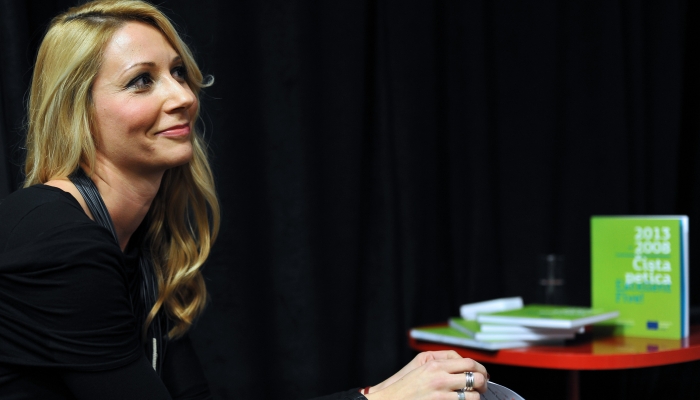Martina Petrović, Creative Europe Desk – MEDIA Office managing director, defends the position of low production capacity before the European Parliament

‘Does European film have a future, i.e. what should be the next steps of national film productions coming from low production capacity countries?’ was the focus of the conference that took place 2 and 3 June at the European Parliament in Brussels. To the invitation of Maltese MP at the European Parliament, Mrs Marlene Mizzi, the managing director of Creative Europe Desk – MEDIA Office Martina Petrović represented the position and interests of 19 ‘small’ countries of low production capacity, including Croatia, at the second part of the conference offering answers to the question whether independent European film industry in low capacity countries is indeed an endangered species.
When it comes to Croatian results in the context of the MEDIA sub-programme, the totally acquired amount of 3.3 million euro between 2008 and 2013 is quite extraordinary and important to stress. Not even merging the two sub-programmes into Creative Europe in 2014 stopped Croatian beneficiaries from continuing the successful fundraising tradition. In 2014 it was 688,303 euro in total, and for the first time it happened that funds were granted for the development of four film projects at a single deadline, which launched Croatia to the high third place with five co-funded film festivals in relation to other 33 MEDIA Sub-programme member states.
However, in relation to the total of granted funds at all 14 public calls - € 109.600,078 – only 10.21 per cent refer to the total funds granted to projects from 19 low production capacity countries. Of the total amount, 56.10 per cent is the share granted to the ‘big five’: France, Italy, Germany, Spain and United Kingdom (the remaining 33.69 per cent went to the medium production capacity countries).
Croatian beneficiaries, as goes for other ‘small countries’ beneficiaries, are the most successful in acquiring funds at open calls referring to film festivals, single project development, automatic and selective distribution, audience development and continuous training. Of 14 open calls only six are active, and the reason is not lack of user interest, but extenuating circumstances in meeting the requirements of eight MEDIA Sub-programme open call guidelines.
Specific characteristics of territory, i.e. geographic position, limited financing resources, linguistic limitations and natural collaboration in terms of co-production with neighbouring and/or small countries, are the factors characterising low production capacity countries which are most often, instead of additional points, due to insufficient understanding of difficulties not taken into account and not evaluated adequately. These are the points supporting the opinion that changes should occur in MEDIA Sub-programme’s open call, as well as different mechanisms to increase their availability in ‘small’ countries. Also, it is necessary to improve the visibility of low production capacity countries in relation to projects coming from ‘the big five’. First of all, it is necessary because practice and results show that imbalance between the granted funds for projects from ‘small’ countries and ‘the big five’ jeopardises European cultural diversity, the richness of European linguistic expression, and respecting the national in the context of a broader European cultural identity as basic principles of European sustainability and European cultural policies.
All this, with a special focus on Croatian experiences in the MEDIA Sub-programme context, was discussed by managing director of CED – MEDIA Office Martina Petrović. The two-day conference was also attended by Günther H. Oettinger, commissioner of the European Commission for DG Connect; Damian Dräghici, Romanian representative at the Committee for Culture and Education at the European Parliament; Annemie Degryse, vice-president of Lumière production and distribution company for Benelux and president of Lunanima; Engelbert Grech, director of the Office for Incentives and Filming in Malta; Pauline Durand Vialle, president of the Federation of European Film Directors (FERA); Silvia Costa, European Parliament MP and president of the Committee for Culture; Matteo Zacchetti, DG Connect representative in charge of MEDIA Sub-programme open call monitoring and Maltese director Rebecca Cremona. The conference moderator was Marlene Mizzi, Maltese European Parliament MP and vice-president of the Committee for Petitions, Committee for Internal Market and Customer Protection and Committee for Culture and Education.
As part of this two-day conference, a film by Maltese director Rebecca Cremona, Simshar, was screened.
